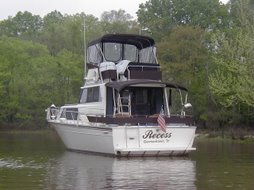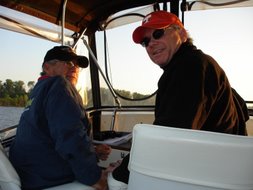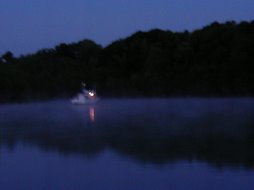The night at Fancy Point Towhead was restful because we were so exhausted that we didn't worry about being overun by a tow boat or dragging an anchor. We intended to get an early start to help regain some of the time lost at Vidalia (however, remember the cruisers law, "don't get in a hurry and never depend upon being somewhere on-time) but our early start was put on hold  by one of those lower Mississippi fog banks. Moisture from the blue gray cloud just didn't settle on the boat and occupants but consumed us and every nook and crany of Detour. We could hear towboats stopped on the river, engines running but making no headway.
by one of those lower Mississippi fog banks. Moisture from the blue gray cloud just didn't settle on the boat and occupants but consumed us and every nook and crany of Detour. We could hear towboats stopped on the river, engines running but making no headway.
 by one of those lower Mississippi fog banks. Moisture from the blue gray cloud just didn't settle on the boat and occupants but consumed us and every nook and crany of Detour. We could hear towboats stopped on the river, engines running but making no headway.
by one of those lower Mississippi fog banks. Moisture from the blue gray cloud just didn't settle on the boat and occupants but consumed us and every nook and crany of Detour. We could hear towboats stopped on the river, engines running but making no headway. I don't remember exactly what time the fog lifted and allowed us to carefully make our way out of the perils of our shallow anchorage and back to the perils of the big river but I knew we had a perfect record of delayed departures. The pressure of keeping a schedule continued to encourage my urge to increase speed and ignore the real issue; gasoline usage. But, Mickey and I have never been very logical in our reasoning when trying to catch fish, hunt or any of those other guy deals.
The weather had moderated from the cold windy conditions of the first two days of the trip and had taken on the more normal warm and humid feel of late April. We set a course for New Orleans and pushed the throttles up to 3000 RPM's and looked to see the tall state capitol building of Louisiana and the city of Baton Rouge very soon.
had taken on the more normal warm and humid feel of late April. We set a course for New Orleans and pushed the throttles up to 3000 RPM's and looked to see the tall state capitol building of Louisiana and the city of Baton Rouge very soon.
 had taken on the more normal warm and humid feel of late April. We set a course for New Orleans and pushed the throttles up to 3000 RPM's and looked to see the tall state capitol building of Louisiana and the city of Baton Rouge very soon.
had taken on the more normal warm and humid feel of late April. We set a course for New Orleans and pushed the throttles up to 3000 RPM's and looked to see the tall state capitol building of Louisiana and the city of Baton Rouge very soon.In the middle of the afternoon, it seemed our trip was to be one of those rare occasions of "no issue" cruising. But never jump to conclusions; the starboard engine began to sputter and I quickly realized that our haste and subsequent waste of gasoline had put our trip again in jeapordy. Not to mention the hazards of being without power in the busy channel of the lower Mississippi River. I knew from experience that Detour's starboard engine used fuel about a gallon an hour faster that the port engine and that we had used the generator, which pulls fuel from the starboard tank, for about an hour. Now, my confidence in calculating fuel useage had taken quite a "hit" and the increased speed had complicated my calculations but I figured we had about an hours gasoline left for the port engine if we idled along.
What to do? We know that no marinas on the lower Mississippi allow pleasure boat to approach their docks (insurance issues) and very few even carry gas (only diesel). I had read a blog written by another pleasure cruiser that there was a small salvage yard owner in the area that  would assist if gasoline became a critical issue. This was a critical issue. I began to look through my planning notes (I did prepare) to see if I could find the telephone number of the slavage dock. Just as always when Mickey and I get into trouble, we found the number and made contact with the dock. Bottom line; yard owner allowed us to dock at his yard, loaned me his pick-up and I drove to the nearest gas station, filled up four six-gallon cans with "high test" and headed back to the salvage yard. The owner would not accept payment for his kindness and I, to this day, marvel at being able to get gasoline in under those circumstances.
would assist if gasoline became a critical issue. This was a critical issue. I began to look through my planning notes (I did prepare) to see if I could find the telephone number of the slavage dock. Just as always when Mickey and I get into trouble, we found the number and made contact with the dock. Bottom line; yard owner allowed us to dock at his yard, loaned me his pick-up and I drove to the nearest gas station, filled up four six-gallon cans with "high test" and headed back to the salvage yard. The owner would not accept payment for his kindness and I, to this day, marvel at being able to get gasoline in under those circumstances.
 would assist if gasoline became a critical issue. This was a critical issue. I began to look through my planning notes (I did prepare) to see if I could find the telephone number of the slavage dock. Just as always when Mickey and I get into trouble, we found the number and made contact with the dock. Bottom line; yard owner allowed us to dock at his yard, loaned me his pick-up and I drove to the nearest gas station, filled up four six-gallon cans with "high test" and headed back to the salvage yard. The owner would not accept payment for his kindness and I, to this day, marvel at being able to get gasoline in under those circumstances.
would assist if gasoline became a critical issue. This was a critical issue. I began to look through my planning notes (I did prepare) to see if I could find the telephone number of the slavage dock. Just as always when Mickey and I get into trouble, we found the number and made contact with the dock. Bottom line; yard owner allowed us to dock at his yard, loaned me his pick-up and I drove to the nearest gas station, filled up four six-gallon cans with "high test" and headed back to the salvage yard. The owner would not accept payment for his kindness and I, to this day, marvel at being able to get gasoline in under those circumstances. I knew we would be very close on gas getting to our marina in New Orleans, so we slowed way  down and made our way through the unbelieveable sights of the highly commercial waterway north of the Big Easy.
down and made our way through the unbelieveable sights of the highly commercial waterway north of the Big Easy.
 down and made our way through the unbelieveable sights of the highly commercial waterway north of the Big Easy.
down and made our way through the unbelieveable sights of the highly commercial waterway north of the Big Easy. 





















